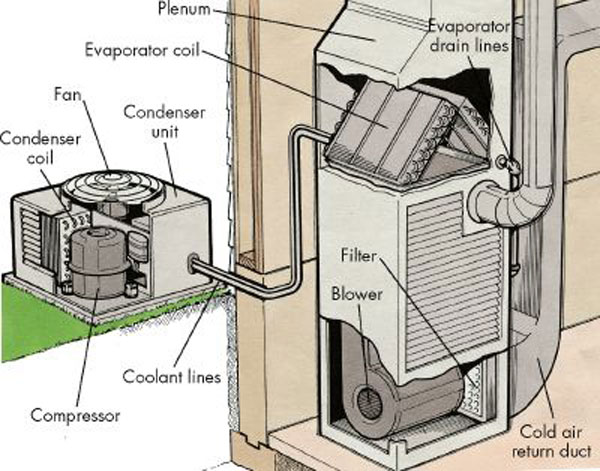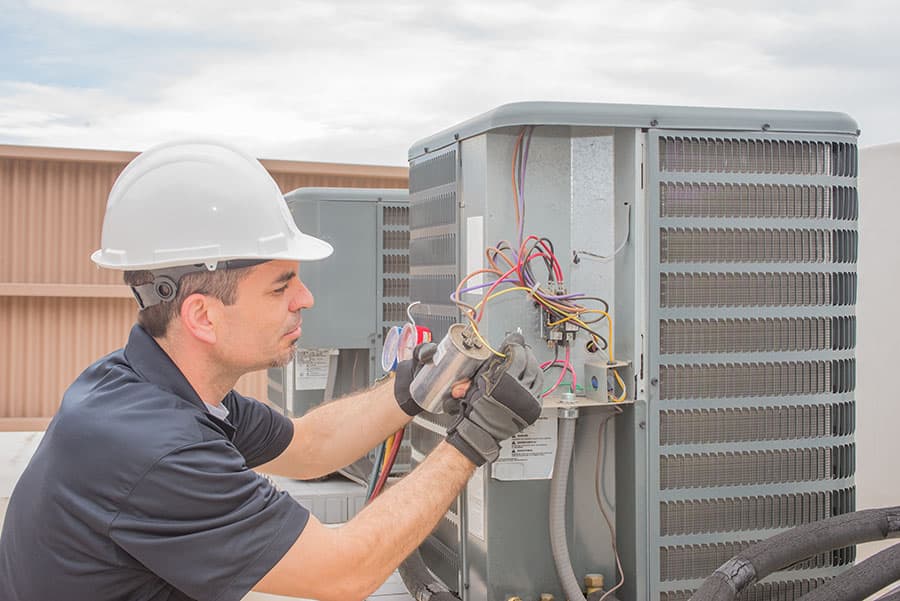Checking Out the Necessary Parts of a Reliable A/c System
An efficient a/c system is constructed on numerous crucial parts that work in harmony. Each part, from the thermostat to the ductwork, plays a necessary duty in keeping convenience and power performance. Comprehending these aspects is vital for optimizing performance and improving interior air high quality. As one checks out these parts, the elaborate connections in between them expose understandings right into boosting overall system effectiveness. What specific elements contribute most to this performance?
The Function of the Thermostat in HVAC Effectiveness

Although frequently neglected, the thermostat plays an essential function in the performance of heating and cooling systems. HVAC experts. This little device functions as the primary control center, regulating temperature level settings and ensuring perfect convenience within a space. By properly picking up the ambient temperature level, the thermostat communicates with the ventilation, air, and heating conditioning systems to preserve the desired environment
An efficient thermostat reduces energy intake by triggering the HVAC system only when essential, thus avoiding extreme home heating or air conditioning. Modern programmable and clever thermostats enhance this effectiveness even more by enabling individuals to set routines and from another location change setups, adapting to daily routines.
In addition, the positioning of the thermostat is necessary; improper location can cause imprecise temperature level readings, causing inefficient operation. On the whole, a well-functioning thermostat not only improves convenience but also adds significantly to power financial savings and the long life of the a/c system.
Comprehending the Value of Air Filters
Air filters offer a crucial function in a/c systems by guaranteeing that the air circulating within a room continues to be clean and healthy and balanced. These filters trap dirt, irritants, and various other toxins, preventing them from being recirculated throughout the environment. By capturing these fragments, air filters add to boosted interior air high quality, which can significantly benefit owners' wellness, specifically those with allergies or respiratory problems.
Additionally, maintaining tidy air filters boosts the performance of HVAC systems. Clogged filters can limit air flow, causing the system to work more challenging to preserve desired temperatures, bring about boosted power usage and higher energy expenses. Regularly changing or cleaning filters is a crucial upkeep step that can lengthen the lifespan of a/c devices. Ultimately, comprehending the importance of air filters allows homeowners and structure managers to take positive measures to assure a well-functioning, efficient a/c system that advertises a comfortable and secure indoor environment.

The Functionality of the Furnace and Heatpump
Heating systems and warm pumps are essential elements of HVAC systems, liable for offering warmth throughout chillier months. Furnaces run by heating air with combustion or electrical resistance, then dispersing it throughout the home by means of ducts. They usually supply fast heating and can be sustained by gas, electrical power, or oil, depending on the system type.
Alternatively, warmth pumps move warmth instead than create it. They draw out warmth from the outside air or ground, also in low temperature levels, and transfer it inside your home. HVAC experts. This twin functionality permits heatpump to likewise give cooling in warmer months, making them flexible options for year-round environment control
Both systems require appropriate maintenance to assure efficiency and durability. While heaters excel in extreme cold, warm pumps can be advantageous in modest climates. Comprehending their distinctive functionalities help home owners in selecting the most appropriate choice for their heating needs.
Checking Out the A/c System
The cooling system is an essential part of a/c systems, available in various kinds to suit various demands. Understanding the effectiveness rankings of these systems is essential for making informed choices regarding power consumption and expense. This area will check out the varied kinds of air conditioning unit and clarify how efficiency scores influence efficiency.
Sorts Of Air Conditioners
While various elements influence the choice of cooling systems, understanding the different kinds readily available is critical for property owners and structure managers alike. Central air conditioning conditioners are created to cool down whole homes or structures, making use of a network of air ducts for air flow. Window systems provide a more local option, perfect for single rooms or tiny areas. Portable ac unit give versatility, allowing customers to move the unit as needed. Ductless mini-split systems are another option, integrating the efficiency of main systems with the convenience of zoning, as they need no ductwork. Geothermal systems harness the earth's temperature level for energy-efficient air conditioning. Each kind includes distinct advantages, making informed selections crucial for efficient climate control.

Efficiency Scores Explained
Recognizing effectiveness ratings is necessary for picking the ideal air conditioning device, as these metrics supply understanding right into the system's performance and power consumption. One of the most usual score for a/c unit is the Seasonal Energy Effectiveness Proportion (SEER), which determines the cooling result throughout a common air conditioning period divided by the overall electrical energy input. A greater SEER suggests better performance. Additionally, the Energy Effectiveness Ratio (EER) is made use of for measuring effectiveness under certain conditions. click here One more crucial metric is the Energy Celebrity accreditation, which signifies that an unit fulfills rigorous energy performance guidelines. By reviewing these rankings, customers can make educated choices that not just optimize comfort yet also reduce energy expenses and ecological impact.
The Importance of Ductwork and Air movement
Effective ductwork design and air flow administration play essential duties in the total performance and efficiency of HVAC systems. Correct ductwork warranties that conditioned air is dispersed equally throughout a room, lessening temperature fluctuations and improving convenience. Well-designed ducts reduce resistance to air flow, decreasing the workload on a/c tools and inevitably decreasing energy consumption.
Airflow management involves strategically placing vents and registers to improve the flow of air. This avoids usual issues such as hot or cool areas, which can occur when air movement is obstructed or improperly balanced. Furthermore, the ideal duct materials and insulation can even more boost performance by lowering warmth loss or gain during air transit.
An effective ductwork system not only adds to power cost savings however can likewise prolong the lifespan of HVAC tools by minimizing unnecessary pressure (HVAC experts). Understanding the relevance of ductwork and airflow is necessary for attaining peak Heating and cooling system efficiency.
Regular Maintenance Practices to Enhance Efficiency
Regular maintenance techniques are vital for guaranteeing peak efficiency of a/c systems. These practices consist of regular evaluations, cleansing, and required fixings to keep the system running effectively. Frequently transforming air filters is important, as stopped up filters can block air flow and lower efficiency. In enhancement, specialists must check and clean evaporator and condenser coils to protect against overheating and power wastage.
Yearly expert examinations are likewise suggested, as skilled specialists can determine possible issues prior to they intensify. Oiling moving components minimizes damage, contributing to a longer life-span for the system. In addition, ensuring that the thermostat functions correctly aids in preserving ideal temperature control.

Often Asked Questions
How Usually Should I Replace My Thermostat?
Thermostats need to generally be replaced every 5 to ten years, depending upon use and technology innovations. Regular checks are recommended to guarantee peak performance, especially if experiencing inconsistent temperature level control or boosted energy costs.
What Dimension Air Filter Is Ideal for My A/c System?
The most effective size air filter for a HVAC system varies by unit design. Usually, it's crucial to seek advice from the proprietor's manual or examine the existing filter measurements to ensure peak efficiency and air high quality.
Can I Mount a Heatpump Myself?
Installing a heatpump separately is possible for experienced individuals, yet it needs knowledge of electrical systems and regional codes. Employing a professional is recommended to assure proper installation and perfect system performance.
Just how Do I Know if My Ductwork Is Reliable?
To determine ductwork effectiveness, one should check for leakages, measure air movement at vents, evaluate insulation high quality, and assess temperature level differences in between supply and return ducts. Specialist evaluations can provide detailed understandings right into general efficiency.
What Are Signs My Heating And Cooling Needs Immediate Upkeep?
Signs that an a/c system needs instant upkeep consist of unusual noises, inconsistent temperatures, boosted energy costs, unpleasant odors, and frequent cycling. Attending to these concerns immediately can avoid more damages and assurance height system performance.
Air filters serve a crucial function in Cooling and heating systems by guaranteeing that the air flowing within a space continues to be clean and healthy. Additionally, preserving tidy air filters improves the performance of A/c systems. Ductless mini-split systems are an additional option, incorporating the effectiveness of main systems with the convenience of zoning, as they need no ductwork. Recognizing effectiveness ratings is necessary for selecting the best air conditioning system, as these metrics provide understanding right into the system's efficiency and energy consumption. The finest dimension air filter for a Cooling and heating system differs by device layout.